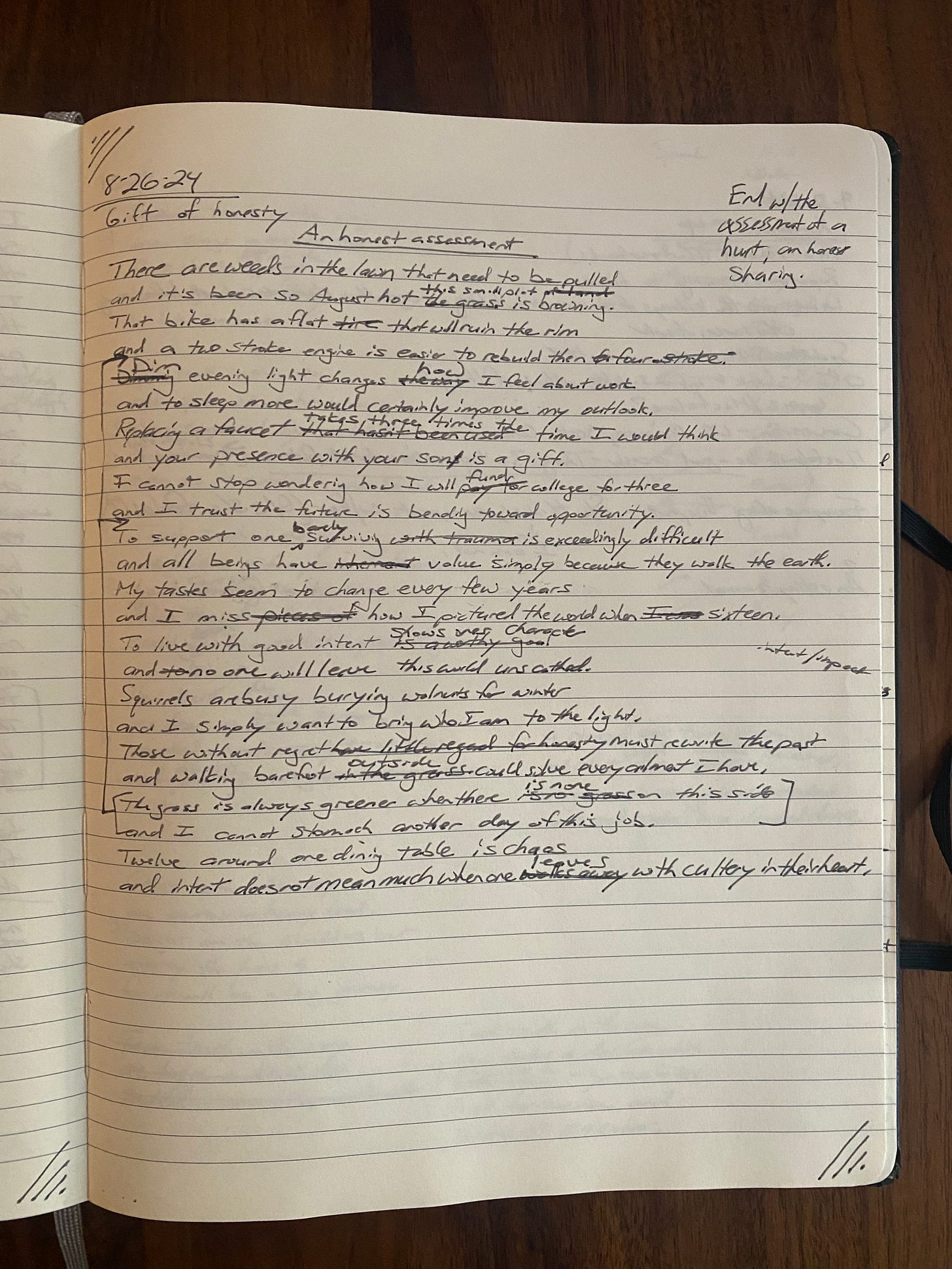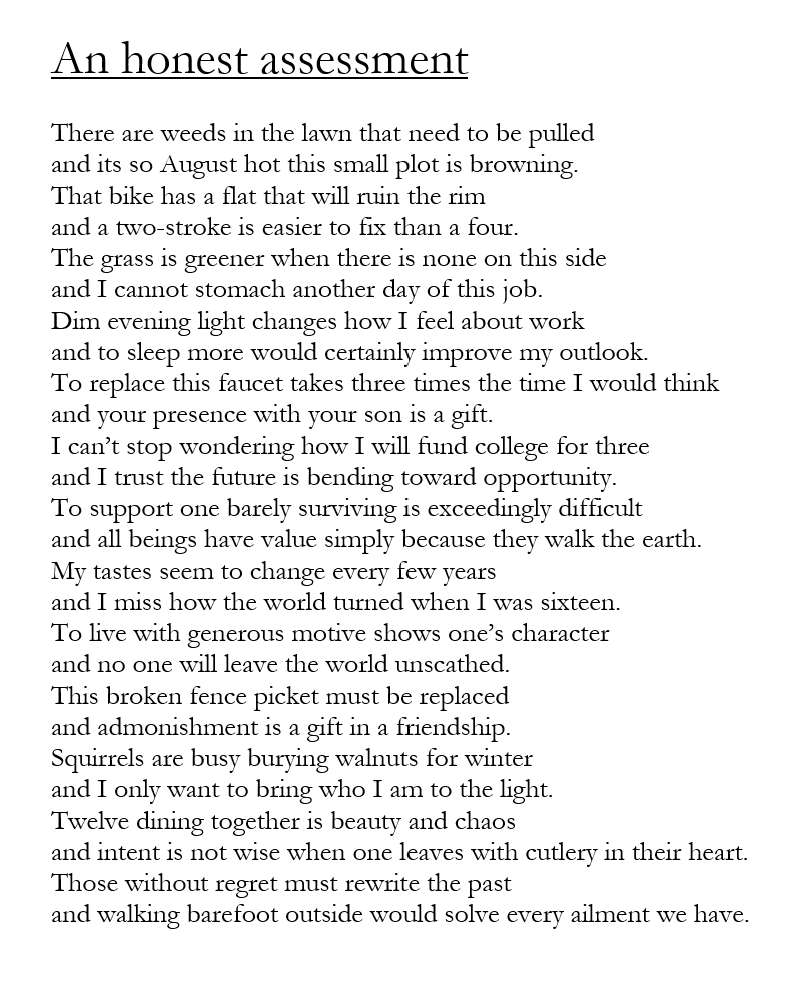An honest assessment: A reflection
Relationship to relationship

On couplets
An honest assessment was written shortly after a relationally difficult experience where fresh wounds quickly became infected with historical complexity. I began writing after a walking conversation with a friend who was involved in this experience, to work towards understanding, healing, and honoring of the complexity. Couplets emerged from this walk that speak to both the complexity of individual experience and how those interwoven experiences cannot be separated. Each couplet speaks to a specific experience and truth that can be found in that experience. They interplay with the prior couplet and transition into the next with more that can be extrapolated with various couplet groupings.
Consider the individual couplets. Each stands alone with two lines that complement each other. Some are simple observations, and some contain internal examinations. Themes of neglect (brown lawn), repair (broken bike), desire (greener grass), self-knowledge (sleep always helps), frustration (replacing a faucet), and fear (financial) are what begin the poem, each an individual thought that carries a relational pattern.
There are weeds in the lawn that need to be pulled
and it’s so August hot this small plot is browning.
That bike has a flat that will ruin the rim
and a two-stroke is easier to fix than a four.
The grass is greener when there is none on this side
and I cannot stomach another day of this job.
Dim evening light changes how I feel about work
and to sleep more would certainly improve my outlook.
To replace this faucet takes three times the time I would think
and your presence with your son is a gift.
I can’t stop wondering how I will fund college for three
and I trust the future is bending toward opportunity.
The next three couplets are fully internal, doubling down on the world of human relationship, first with someone who is close, second with oneself, and third with humans at large.
To support one barely surviving is exceedingly difficult
and all beings have value simply because they walk the earth.
My tastes seem to change every few years
and I miss how I pictured the world when I was sixteen.
To live with generous motive shows one’s character
and no one will leave the world unscathed.
We then receive two couplets that return to a blend of the outside and inside. This reintroduction of the external on the front end brings an intensity to the back end, the internal dialogue hitting hard due to the short relief of the simple outside observations. But a reread makes it clear that the broken fence picket is the representation of what must be admonished, and the squirrel hiding what they have is the opposite of the desire to be seen.
This broken fence picket must be replaced
and an admonishment is a gift in a friendship.
Squirrels are busy burying walnuts for winter
and I only want to bring who I am to the light.
The second to last couplet is the beginning of the culmination. It speaks to the specific source of hurt that spurred on the poem, acknowledging that relationship is a complex mix. Coming back to this stanza now, I also see the different parts of ourselves that sit around this figurative table, sometimes at peace and sometimes at war.
Twelve surrounding a dining table is beauty and chaos
and intent is not wise when one leaves with cutlery in their heart.
The final couplet takes an interesting slant on honesty. There is a fashion to having no regrets in our society but live for a while and I do not think one can escape life without regret. An honest assessment of our past is always a mixed bag. There are times of wisdom and foolishness, of moving forward and sliding backwards, and of building and burning. Seeing the events of our lives as what made us who we are today is a beautiful way of looking back. But I think this view, when looked at honestly, always contains regret. I can regret a choice I made and acknowledge I would not be who I am today without that choice.
Those without regret must rewrite the past
and walking barefoot outside would solve every ailment we have.
On the one poem
When this poem is read as one stanza, relationship emerges as the overarching theme.
Our society loves individual success stories…the self-made man, the superstar athlete who outworked everyone else to become the apex, and the Grammy winning artist who rocketed onto the scene. We are taught a rugged type of individualism by those that came before us and are rewarded for traits that make us stand apart from those who stand around us. Merit increases, scholarships, and praise are heaped on those that thrive in setting themselves apart from the everyday other. It’s pounded into us as if this is the primary way of being that should supersede all others.
It is interesting that we also bristle when the one who is held up exudes an air of self-absorption. We want the post-game interview to include a recognition of the team, coaches, and a higher power, or the award acceptance speech to include the humble recognition that success was impossible without a team of musicians, producers and managers. We feel something inherently wrong with one who pats only their own back.
Why this seeming conflict? When we reflect on our path, we often look to ourselves as the sole influencer of our outcome as a way of claiming control. We do want to belong to the societies around us, but we don’t want the uncertainty that comes from belonging to something beyond ourselves. In our minds, maintaining separation equals control over our destiny. Relationship brings uncertainty due to the many factors at play. Yet deep down we know that we are intrinsically connected to everything around us.
If separation brings control, but connection is intrinsic, then the control we feel from being an individual is an illusion. There is nothing in this world that stands alone, but pain shows up in places where we think we are the exception. Consider yourself as self-made, and every failure comes down to your incompetence. Hold your success as only yours, and you burn a bridge with the colleague who polished your pitch just enough to resonate with the broad audience that helped your business to survive. Hold internal characteristics such as discipline or resilience up high, and you claim creative power to what was gifted you…the place you were born into by happenstance, the family that shaped you that you did not choose, and the traits that came from a place you cannot explain. Trace a path far enough back, and you simply appear from events and circumstances that you had nothing to do with, but that you are interrelated with.
Reread this poem with this relational view in mind. Use your logical mind but perhaps read the stanzas with your emotions in the forefront and see what emerges with the couplets intertwined. My hope is you find yourself and your stories somewhere in the relational landscape that emerges in the joining of and between the individual couplets.
Final thought
I did some slight editing on this poem between publishing last month and today. If you’re interested in the altered version, I have included the update below.
May regret and relationship bless you…
Brian
If you missed the original “A Poem” post of An honest assessment, I hope you will read and enjoy! You can find it here.




Brian, I’m reading this on a moving train today. And I’m resonating with the way your poem repeats the beautiful idea that for every truth, the opposite can also be true.
https://substack.com/@collapseofthewavefunction/note/p-168121498?r=5tpv59&utm_medium=ios&utm_source=notes-share-action